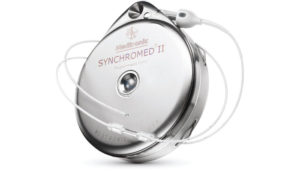 Medtronic (NYSE:MDT) this month updated physicians on a warning it 1st issued in July 2011 about the batteries in its SynchroMed II implantable drug infusion pump.
Medtronic (NYSE:MDT) this month updated physicians on a warning it 1st issued in July 2011 about the batteries in its SynchroMed II implantable drug infusion pump.
The pumps are used primarily to treat chronic pain or severe spinal or cerebral spasticity. The issue, 1st reported in July 2009, relates to the formation of a filmy substance within the pump battery that can lead the device to shut down suddenly, causing a patient’s pain and symptoms to return or triggering withdrawal symptoms. Returned product analysis proved the failed devices’ alarms functioned as designed, Fridley, Minn.-based Medtronic said at the time.
There were 55 confirmed cases of the devices failing as of May 32, 2011, Medtronic said back then, including 1 death attributed to baclofen withdrawal syndrome.
In a letter dated April 2017 sent to European doctors, Medtronic updated the numbers for pumps with batteries made from March 2005 through December 2010. The company said there was a 0.13% cumulative probability for pump failure at 72 months due to the issue.
“This rate remains within the failure rate upper bound of 0.2% that was reported in 2011,” the company said.
For pumps with batteries made between January 2011 through June 2011 there was a 3.17% cumulative probability of failure due to the issue, Medtronic said, which exceeds the 2011 upper bound limit.
Prophylactic replacement of SynchroMed II pumps is not recommended “because of the estimated low occurrence rates, the presence of pump alarms, and the risks associated with replacement surgery,” the company said. But if low battery reset, premature elective replacement indicator or end of service alarms occur, replacement surgery should be set up “as soon as possible,” according to the letter.
The SynchroMed II and SynchroMed EL pumps were recalled in 2013 because they unintentionally delivered drugs during the priming bolus procedure and patients were at risk for overinfusion in the cerebrospinal fluid followed by a period of reduced drug delivery. As of July 5, 2016, there were 103 incidents of overinfusion among the more than 238,000 SynchroMed II pumps implanted since the device came to market (0.04%).

